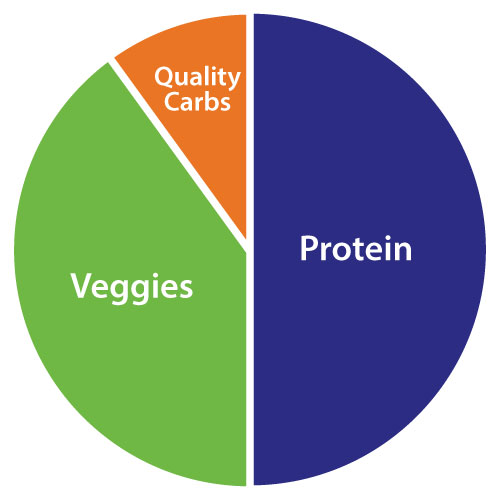Bariatric Carbs Per Day:
Setting the Record Straight
Ladies and gentlemen, welcome to Carb-a-Palooza, where we'll be discussing the often misunderstood topic of bariatric carbs per day.
First things first, let's set the record straight on a little myth that's been circulating: no, you don't have to give up carbs for the rest of your life after weight loss surgery!
It IS true however, that you'll have to cut back on carbs in the recovery stages and then learn to eat quality carbs vs junk carbs in the long haul.
In the short term you can be looking at <50 grams carbs/day and in the long term 75-100 grams per day...or even up to 130 grams per day. Let me explain...
Bariatric Carbs Per Day:
A Moving Target
After surgery, reducing carbs isn't a choice, it's a necessity.
Protein is a priority post op ...it's your new BFF... and your stomach is too small to hold much else. So, it's not that you can't eat carbs after gastric sleeve, bypass or band, it's just that you won't be able to eat as many as you used to...for awhile.
The amount of them you can eat in the recovery period is lower than the amount you can eat for the rest of your life. This bariatric carb chart gives you a glimpse of how the carb game changes over time.
So don't worry, you can still enjoy carbs...and a little more of them as time goes on. Just make sure to emphasize quality carbs and ditch the highly processed, packaged junk food carbs. That's really the bigger issue!
Get this: There's no specific guideline for bariatric patients when it comes to carbohydrates beyond the recommended daily allowance (RDA) for adults: 130 grams of carbohydrate per day. True dat.
While you may only fit <50 grams of carb in your new tiny tummy in the early post op stages, once you're fully recovered, you may be able to realistically reach 75-130 grams of carbohydrates per day...and that's STILL in line with what's considered "low."
Now, you might be thinking "But wait, Suzette, are you really a bariatric dietitian? Those sound like awfully big numbers! Are you sure you know what you're talking about here?!"
Yes...I am, and yes I do ;)
The definition of a "low carb" diet is based on a calculation that's a percentage of total calories....not some arbitrary low number of grams. A healthy low carb diet is when 40% of total calories (less than half) come from carbs.
How to Do the Math
The math is fairly simple...if you like math. If not, skip this part!
Let's say you're eating 700 calories per day and want to aim for 40% of those calories to come from carbs. First, figure out 40% of your total calories, then convert that number to grams by dividing by 4 (since 1 gram of carbs has 4 calories.)
I'll break it down for you here:
1. First, figure 40% of the total calories like this:
- .4 x 700 calories = 280 calories
2. Then, convert the calories to grams
One gram of carbohydrate has four calories
So divide the calories you just figured, by 4 calories per gram...like this:
- 280 calories / 4 calories per gram = 70 grams of carbs
This means if you're trying to eat a low carb (40%) diet and you're eating 700 calories, you can eat 70 grams of carbohydrates and still say you're on a "low carb" diet.
Here’s another example:
At 1000 calories, 40% carb= 100 grams carbs per day
- The math: .4 x 1000 calories / 4 calories per gram = 100 grams daily carb
Get Off the No-Carb Bandwagon
Now, while all this talk of percentages and math may sound like a snooze-fest, let's not forget the real goal here: long term success.
The negative of being on the no-carb band wagon or cutting carbs toooo low is that it's not sustainable.
When carb intake is too low, your blood sugar (energy level) drops too low and you wind up craving carbs (and then likely binging on them) to make yourself feel better. Sound familiar?
Also, choosing foods simply based on their carb count (or lack of) doesn't necessarily lead to healthy choices or a healthy balanced diet.
Low carb cookies are still cookies!
Quality Carbs Over Junk Carbs
One of the key factors in achieving success is consistently choosing quality carbs over junk carbs.
So, instead of saying "goodbye" to all carbs, or trying to keep bariatric carbs per day to a particular low number... say "hello" to healthier options like veggies, fruits, beans, and whole grains. These are the kinds of quality carbs that will leave you feeling satisfied and energized, not sluggish and craving more.
And as a side effect, you'll eat less of them. It works like magic, but no wand is necessary!
Plate Method

The Bariatric Portion Plate Method is a simple and easy way to control your carb intake. By proportioning your plate correctly, the carbs will naturally fall into place. It's like having your own personal carb-counting ninja on your plate!
This method is best used once you're fully recovered and well along the way on your bariatric diet for life.
- 3-4 oz protein
- ⅓ cup of vegetables
- 2-4 tablespoons of a quality carbs
The Bottom Line for Your Bottom Line:
Bariatric Carbs Per Day
- Instead of fixating on the numbers of bariatric carbs per day, focus on the quality of the carbs you eat.
- Get off the no carb bandwagon!
- Master your understanding of the "low carb" bariatric diet.